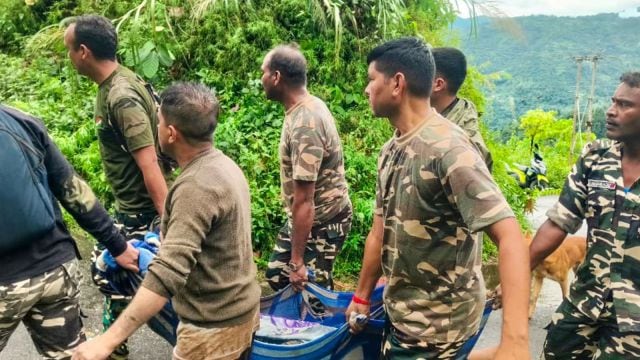Darjeeling Devastation | ‘Everything happened in minutes… the hill just came down’: Everyone chips in for search and rescue operations
Tourists who had come for a post-Durga Puja getaway remain stranded in hotels. Some have volunteered to help rescuers
 Rescue operation underway in Darjeeling, Sunday (PTI Photo)
Rescue operation underway in Darjeeling, Sunday (PTI Photo)The 12 hours of unrelenting rain have left the Darjeeling hills scarred and stunned. At least 20 people, including several children, were killed and many more injured after a string of powerful landslides swept through Mirik, Sukhiapokhri, Darjeeling and adjoining areas on Sunday night and into Monday, officials and rescue workers said. Roads were buried under mud, bridges snapped, villages were isolated and hundreds of tourists were left stranded in hotels and homestays.
The misty slopes of the “Queen of the Hill”, usually a picture of calm, became a scene of wreckage, flattened hamlets, half buried roads, broken houses, and overturned vehicles. Survivors have begun the grim work of clearing debris and searching for loved ones, even as rain and unstable ground complicate relief efforts.
“We have seen floods and storms, but never this,” said Pema Bhutia, a 58-year-old tea worker from Mirik, standing before what used to be her home. “Everything happened in minutes. The hill just came down, like a wave of earth.”
Rescue teams from the district administration, police, disaster response forces and volunteers worked through fog and drizzle, combing through mud with excavators and human chains.
A local school converted into a relief camp was sheltering nearly 300 displaced people, where volunteers were distributing hot meals from large pots. Drones were being used to assess damage in inaccessible hamlets, officials said.
“We have not gone home since Saturday. Some of us lost friends in the slide,” said Rohit Chhetri, a member of the civil defence team working near Teesta Bazar. “The ground is still unstable, but we can’t stop. People are waiting,” he said.
Tourists who had come for a post-Durga Puja getaway remain stranded in hotels. Some have volunteered to help rescuers. “We couldn’t just sit and watch. The locals have been so kind to us. This is the least we can do,” said Anjali Das, a tourist from Howrah helping pack relief kits.
The deluge paralysed key routes. National Highways 55 and 10 were blocked in places, cutting off access to and from Siliguri and isolating several remote villages. Darjeeling police issued advisories urging tourists not to venture out and gave a control-room number for those in need of assistance.
“We heard a deafening sound around 2am and the ground shook. In the morning the road was gone, just a heap of mud and trees. We are completely cut off,” said Praveen Sinha, a tourist from Kolkata who was staying in Mirik. Others described sleepless nights, power cuts and limited phone connectivity.
Local tour operators said hundreds of tourists, who had travelled to the hills during and after Durga Puja, are stuck in hotels and homestays.
“This is the peak tourist season. Many of our guests are stranded in Kalimpong and Mirik. Roads are blocked everywhere. We are coordinating with police and GTA authorities to ensure their safety,” said Bikash, a tour operator based in Darjeeling.
Local life has been disrupted beyond the immediate human cost. Tea gardens reported flooding and erosion, and several culverts and supply routes were washed away, threatening livelihoods and slowing relief work.
Markets and shops in Darjeeling town remained closed, and the iconic toy-train service between Darjeeling and Ghum was suspended. The Gorkhaland Territorial Administration temporarily shut popular tourist spots such as Tiger Hill, Rock Garden and Batasia Loop.
The administration has asked anyone in the affected areas or tourists in need of help to contact local police control rooms; district authorities are also appealing for blood donations and material aid to support relief camps.
The human response has been immediate and communal. Monks from a nearby monastery distributed biscuits and milk, students swept streets and collected donations, and volunteers formed supply lines to pass food and water to stranded families. “We found a child alive this morning under the debris. That gives us the strength to keep digging,” said one rescue worker.
Officials warned that the ground remains unstable and that continued rain could trigger fresh slides. Helicopter assistance was being considered, weather permitting, to airlift stranded people and ferry supplies to cut-off localities. District authorities said they were coordinating with state agencies to prioritise search and rescue, restore communications and open alternative routes where possible.
For many residents the trauma is layered on top of old memories of disaster. “This town has suffered, but it always comes back. In 1968, hundreds died. In 2015, we buried friends. Every time the hill falls, we rise again,” said Karma Sherpa, a 63-year-old taxi driver ferrying relief workers since Sunday.
At dusk, in the dim light, the people of Darjeeling wait for the skies to clear, for the roads to open, for the mountain to forgive. For now, Darjeeling’s hills, usually alive with tourists and tea shops, stand silent, wrapped in fog and the work of recovery.







